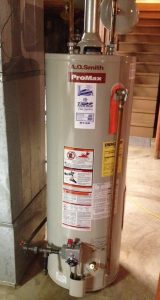How Does a Tankless Water Heater Work?

As homeowners become more conscious about how much energy they consume, many people are looking for energy-efficient alternatives to traditional home appliances. One such example is a tankless water heater. According to the Department of Energy, a tankless water heater can save you 24-34% off of water heating costs if your home uses 41 gallons of water per day or less. So what exactly is a tankless water heater and how does it work to provide your home with hot water?
What is a tankless water heater?
With traditional water heaters, water is stored in a large tank and heated so that you have hot water ready when you need it. Energy is constantly used to keep the water in this tank at a specific temperature, even when hot water is not in use. The amount of energy that is used to keep a storage tank hot when it’s not in use is known as “standby loss.”
Tankless water heaters were introduced as a way to avoid the standby losses associated with traditional water heaters. Instead of heating a tank of hot water, these units heat water on-demand whenever you need it. Without a tank to keep warm, tankless water heaters use little to no energy when hot water is not being used in your home.
It’s important to note that because tankless water heaters have a decreased flow rate, they aren’t ideal for everybody. Contact Tiger if you need some help deciding if a tankless unit is right for you!
How does a tankless water heater work?
Tankless water heaters are connected to your home’s plumbing system and typically mounted on a wall. When there is a need for hot water in your home, the unit immediately turns on its heat source. The two most common heat sources for tankless water heaters are gas and electricity.
Once the heat source is turned on, the heat exchanger inside of the unit heats up. As cold water enters the unit, it absorbs heat from the heat exchanger and is delivered to the tap that is calling for hot water. Any flue gasses that are produced during the heating process are vented directly out of your home.
When hot water is no longer needed, the unit shuts off and remains inactive until the next time someone needs hot water in your home.
If you have any questions about how a tankless water heater works, or if you’d like a plumbing system serviced or installed in your home, contact Tiger, your Glen Carbon area plumbing, heating and air conditioning company.
photo credit: c3k
Financing
Options
Winning Team





















